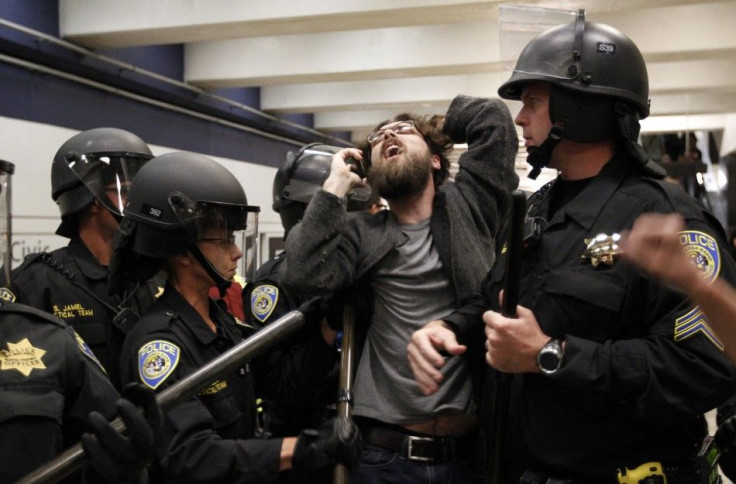BART Cellphone Shutdown Confronts Anonymous Protest: Awaiting FCC Investigation

Monday evening marked the latest confrontation of San Francisco's Bay Area Rapid Transit (BART) with the hacker collective Anonymous, which ended in partially closing stations due to a crowd of some 150 protesters at Civil Center Station.
Now the Federal Communication Commission (FCC) says it is investigating BART for its shutdown of cell phone services in its stations.
Anonymous called for a protest against BART following last Thursday, when wireless networks in some stations were shut down for around three hours to thwart demonstrators organizing a protest over a police shooting of an alleged knife-wielding passenger last month.
BART officials told The AP that the decision to cut cell phone service on Thursday, a move criticized by the American Civil Liberties Union and others, was made out of concern for passengers' safety.
"It's wrong," said ACLU lawyer Michael Risher, whose group was scheduled to meet later Monday with BART's police chief at the agency's headquarters in Oakland. "There were better alternatives to ensure the public's safety."
Starting around 5 pm Monday, Anonymous staged a protest at BART stations.
Chanting "No Justice, No Peace. Disarm the BART Police," the protestors have successfully created enough commotion to stop BART. As a result of stations' closing at Civil Center, Powell, Montgomery and Embarcadero, hundreds of commuters were stranded.
This time, BART closed stations but refrained from shutting down cell transmissions, unlike last Thursday.
BART officials have said their primary concern is to ensure safety.
"Once the platform becomes unsafe, we can't jeopardize the safety of patrons and employees," BART Deputy Police Chief Dan Hartwig told the Los Angeles Times.
"This, however, does not preclude the future use of this tactic should it be deemed necessary to protect our customers from the potential of dangerous conditions," said BART spokesman James K. Allison.
The Federal Communications Commission confirmed Monday that it was investigating BART's right to cut off cellular service. According to ABC News, the ACLU of Northern California held off on filing suit against BART, but sent an angry letter to the FCC, calling BART the "first known government agency in the United States to block cell service in order to disrupt a political protest."
"We are continuing to collect information about BART's actions and will be taking steps to hear from stakeholders about the important issues those actions raised, including protecting public safety and ensuring the availability of communications networks," the FCC said in a statement.
The FBI and Department of Homeland Security are also involved, after BART asked for their assistance in preventing further cyber-attacks by the hacker group.
Cutting off cell phone service in response to a planned protest is a shameful attack on free speech, said the Electronic Frontier Foundation, an internatioanl non-profit digital rights advocacy and legal organization.
"I think it's very dangerous territory," Gene Policinski, executive director of the First Amendment Center at Vanderbilt University, told the News. "The right to protest is as American as apple pie."
"In this case, do they meet the very high test of imminent danger in a specific area?" questioned Policinski.
While BART accommodates expressive activity in certain areas of its property, its management said there are limits.
"Paid areas of BART stations are reserved for ticketed passengers who are boarding, exiting or waiting for BART cars and trains, or for authorized BART personnel. No person shall conduct or participate in assemblies or demonstrations or engage in other expressive activities in the paid areas of BART stations, including BART cars and trains and BART station platforms," said BART in a statement.
BART considered the protest as a civil disturbance during commute times at busy downtown San Francisco stations that could lead to platform overcrowding and unsafe conditions for BART customers, employees and demonstrators.
Anonymous hacked into BART website on Sunday, leaking thousands of personal data online.
"Under no circumstance, unless police are shot at, make police killings acceptable. Non-lethal weapons were available to use during both incidents, providing even that was necessary, but instead they shot to kill. Next they violated the people's right to assembly and prevented other bystanders from using emergency services by blocking cell phone signals in order to stop a protest against the BART police murders," the hackers said in a statement.
More cyber attacks are expected to come, according to Anonymous.
© Copyright IBTimes 2024. All rights reserved.





















